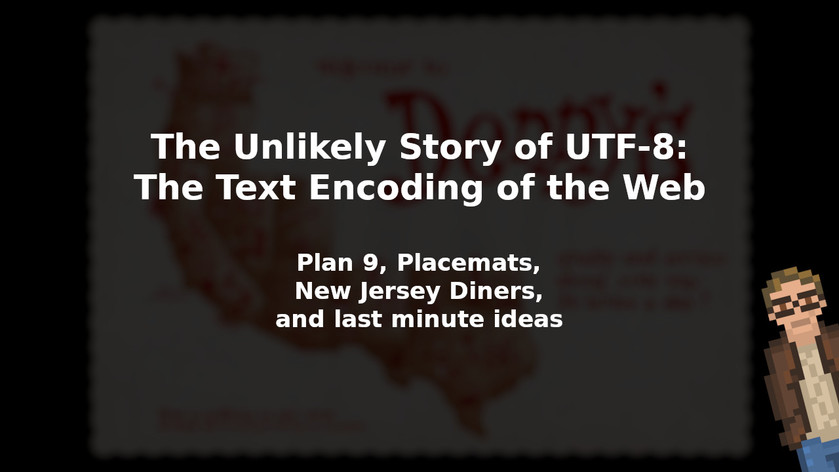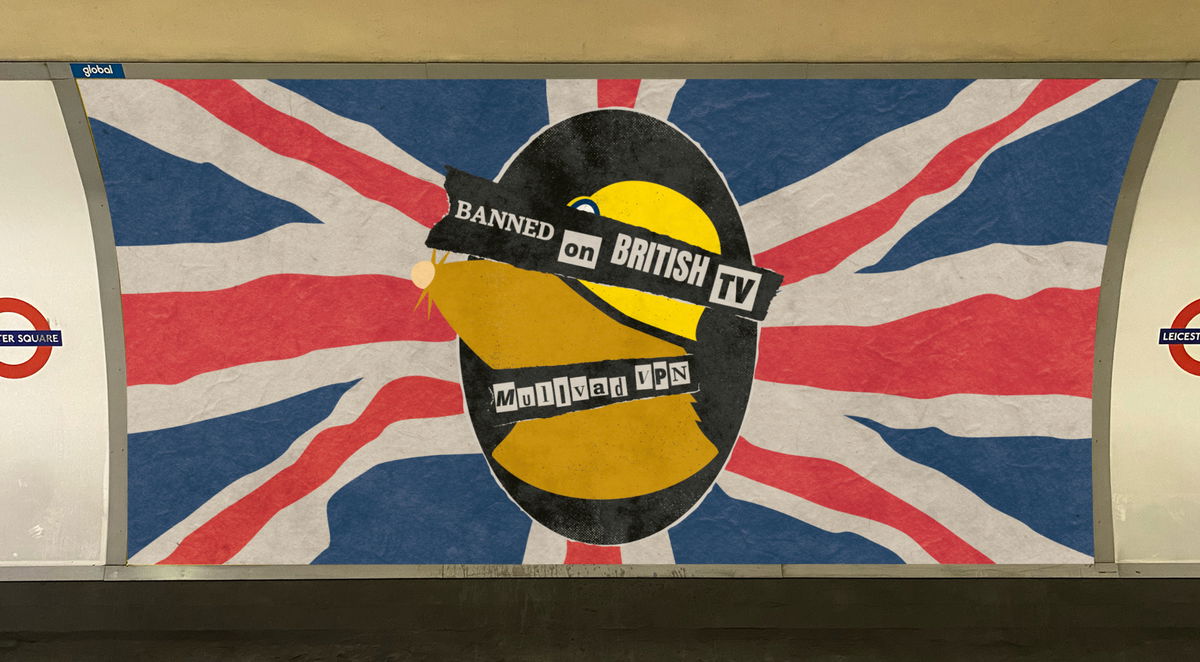If you are reading this on a computer -- of any kind -- odds are good that the words on the screen are all encoded using something called "UTF-8".
UTF-8 (or "Unicode Transformation Format - 8 bit") is, put simply, a format for encoding and storing text -- one which allows for far more text characters than the older "ASCII" encoding (which could only show a total of 95 printable characters).
And UTF-8 is, quite simply, everywhere.
Nearly every major computer operating system heavily uses UTF-8 for handling text... likewise it is the standard for websites, with close to 100% of all webpages explicitly using UTF-8 for the text on the page.

An argument could be made that UTF-8 is one of the most successful and widely adopted standards in all of computer history.
But this almost wasn't the case.
In fact, UTF-8 was created -- at the very last possible moment -- and it was first implemented in a computer system that most people don't even know existed.
X/Open's search for better text encoding
In the early 1990s, text encoding was... an issue.
While solutions for extended character sets (beyond simple ASCII characters) existed, they were less than ideal. To put it mildly. The most popular solution, known as UTF-1 (aka "ISO 10646"), suffered from serious performance issues... and often caused significant problems with software which used plain "ASCII" text (including UNIX file system paths).
Having a character encoding on UNIX systems that could cause problems with UNIX file systems? Not good.
Obviously a new type of text encoding was needed.
So, in 1992, X/Open (originally known as the "Open Group for UNIX Systems", a consortium of UNIX vendors, including: Sun, HP, AT&T, IBM, and several others) set about the task of selecting a proper text encoding standard to be used across all of the UNIX world.
The proposal that gained the most traction was known as FSS/UTF (aka "File System Safe Universal Character Set Transformation Format"). Roills off the toungue, right?
This proposal was both faster than the old text encoding standard... and, as the name suggests, it was "File System Safe". Which was a big win.
Enter: The Plan 9 Nerds
Which brings us to September 2nd, 1992. Sometime in the early evening.
The X/Open group was meeting, in Austin, Texas, to formally decide on the file encoding standard.
Looking to get some feedback on the proposal, some members of X/Open made a call to two legendary programmers -- Ken Thompson and Rob Pike -- who were working on the Plan 9 Operating System project at Bell Labs in New Jersey.
A little background...
Ken Thompson was one of the creators of MULTICS, UNIX, the B programming language (the predecessor to C), among many other accomplishments.
Rob Pike, also a UNIX programmer, was the co-creator of Blit, writer of multiple UNIX and programming books, and the creator of the first UNIX windowing system.
To call these two "absolute legends" in the world of computing would be, perhaps, a bit of an understatement. The two were currently working together on a research operating system, at Bell Labs, called Plan 9. An attempt to fix some of the perceived shortcomings of UNIX... by the creators of UNIX, itself.
What happened next... after Ken Thompson and Rob Pike received that phone call? Luckily, we have a detailed accounting... written by Rob Pike, himself.
"We had used the original UTF from ISO 10646 to make Plan 9 support 16-bit characters, but we hated it. We were close to shipping the system when, late one afternoon, I received a call from some folks, I think at IBM - I remember them being in Austin - who were in an X/Open committee meeting. They wanted Ken and me to vet their FSS/UTF design."
Asking two legendary engineers for their input? You can probably guess what happened next...
"Ken and I suddenly realized there was an opportunity to use our experience to design a really good standard and get the X/Open guys to push it out. We suggested this and the deal was, if we could do it fast, OK."
That's right. Ken and Rob had some ideas. And the X/Open folks agreedd to listen to those ideas... if they could get them something fast.
And, by fast, they really meant "immediately... like... right now." Because the X/Open team were, quite literally, all gathered in Austin to decide on this... right then.
"Yeah. I could eat."
Ken and Rob did what any good programmers would do when placed on an almost impossibly tight deadline -- and needed to come up with an amazing idea that could change the course of computing for decades to come... they went out to grab some grub.
"So we went to dinner, Ken figured out the bit-packing, and when we came back to the lab after dinner we called the X/Open guys and explained our scheme. We mailed them an outline of our spec, and they replied saying that it was better than theirs (I don't believe I ever actually saw their proposal; I know I don't remember it) and how fast could we implement it? I think this was a Wednesday night and we promised a complete running system by Monday, which I think was when their big vote was."
Remember. This was 1992.
Which means, while laptops and such certainly existed, most people (even legendary programmers) did not have any sort of mobile, portable computers. Certainly not the kind you could take out to a restaurant.
So what, pray tell, did they write their new text encoding design on?
A placemat from a New Jersey diner.

Seriously.
"UTF-8 was designed, in front of my eyes, on a placemat in a New Jersey diner."
The boys, Ken and Rob, now had just a few days to get all of this done -- before the big vote on the new text encoding standard. And they sure as heck didn't waste any time.
They got back from dinner, placemat in hand, and got to work.
"So that night Ken wrote packing and unpacking code and I started tearing into the C and graphics libraries. The next day all the code was done and we started converting the text files on the system itself. By Friday some time Plan 9 was running, and only running, what would be called UTF-8. We called X/Open and the rest, as they say, is slightly rewritten history."
They converted an entire operating system over to a brand new -- just designed on a placemat -- text encoding format... in less than two days.
Here's the rough time-line:
- Wednesday (Sep 2) evening: Dinner at a New Jersey Diner. Ken Sketches out the idea on a placemat.
- Wednesday night: Coding begins.
- Thursday: Coding complete.
- Friday: Entire Plan 9 operating system is now using "UTF-8".
- Monday (Sep 7): X/Open group votes to use the Ken/Rob encoding design.
On Tuesday, September 8th, 1992 (at 3:22am), mere hours after the official vote to accept their text encoding design, Ken Thompson sends out the following email regarding Plan 9 now using UTF-8:
"The code has been tested to some degree and should be pretty good shape. We have converted Plan 9 to use this encoding and are about to issue a distribution to an initial set of university users."
That's right.
Ken and Rob got a call asking for feeback on a Wednesday. By the next Tuesday (at 3am) they were ready to ship a version of their Plan 9 OS with all the changes, and their designs had been voted on by the largest UNIX companies in the world.
Like I said.

These guys are legends.
What about that placemat?
Considering the vast impact of UTF-8 on the world of computing... whatever happened to that original "design document" (aka "the placemat")? It would certainly be of historic significance.
"I very clearly remember Ken writing on the placemat and wished we had kept it!"
Let this be a lesson to all of the programmers out there:
Keep all of you doodles, notes, and sketches you make for your projects... you never know when one of those projects will become critical to the entire world... making your quick sketch worthy of being in a museum.
Especially if it's on a placemat. From a diner. In New Jersey.
Copyright © 2023 by Bryan Lunduke. All rights reserved. The contents of this article are licensed under the terms of The Lunduke Content Usage License.


















